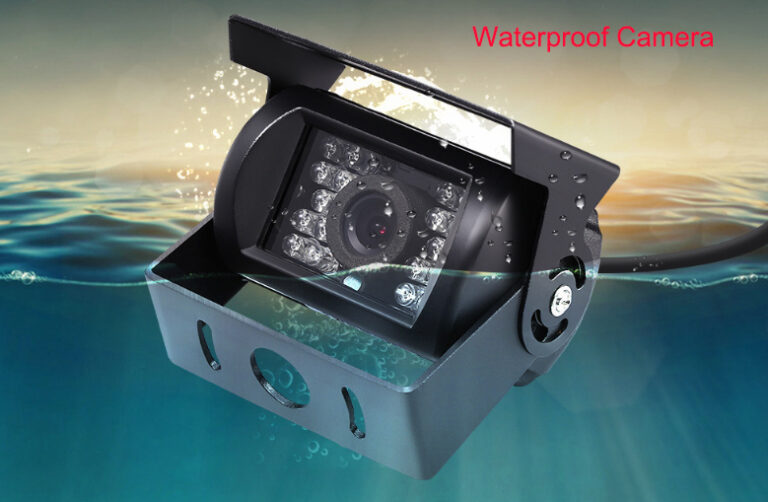Waterproof cameras have become essential in rearview and reversing systems, especially for vehicles like commercial trucks, RVs, and agricultural machinery. In challenging environments such as rain, mud, or extreme weather conditions, high-quality waterproof cameras offer reliability, clear vision, and durability. But what sets these cameras apart from the competition?
A waterproof camera is crucial for rearview and reversing monitor systems because it provides clear vision in harsh weather conditions like rain, fog, or mud. These cameras come with an IP67 or IP69K rating, ensuring they are resistant to water, dust, and extreme temperatures, making them reliable for long-term use in commercial vehicles, RVs, and heavy machinery.
Let’s take a closer look at the benefits and specific considerations for selecting a waterproof camera for your vehicle.
What is the Difference Between a Backup Camera and a Rear View Camera?
The key difference lies in how they operate. Backup cameras activate automatically when the vehicle is put in reverse, giving the driver a real-time view of what’s behind. This helps avoid obstacles, ensuring safer reversing. Rearview cameras, on the other hand, can be turned on at any time to check the rear surroundings while driving. Both types of cameras are essential for safety, but waterproof designs make them even more reliable in wet and muddy environments.
For vehicle owners operating in extreme conditions, having a waterproof camera for both backup and rearview purposes provides peace of mind. With an IP67 or IP69K rating, these cameras are designed to resist water, dust, and temperature extremes, so they can withstand rough environments and last longer without compromising on quality.
How Do I Keep My Backup Camera Clear in the Rain?
Rain, dirt, and grime are common challenges that affect the performance of backup cameras. One effective solution is to regularly clean the lens with a soft cloth and apply a water-repellent coating, like Rain-X, to prevent water droplets from sticking to the surface. This ensures that the camera view remains clear even during heavy downpours.
Choosing a waterproof camera can significantly reduce these issues as these cameras are built to withstand rain and debris. Their enclosures are designed to keep moisture and dirt away from the lens, ensuring a clear view for drivers, regardless of the weather.
Does Rain Affect a Backup Camera?
Yes, rain can make regular backup cameras less effective. In heavy rain or fog, cameras not designed for these conditions can become blurry, reducing visibility and increasing the chance of accidents. Waterproof backup cameras, however, are designed to continue functioning in these conditions. Cameras with an IP69K rating, in particular, are highly resistant to water and dust, making them ideal for vehicles that frequently operate in wet, muddy, or dusty environments.
These cameras maintain a clear view even during the worst weather, providing reliable assistance when reversing, which is essential for large vehicles like commercial trucks or RVs.
Do Wireless Rear View Cameras Work?
Wireless rear view cameras are a popular choice due to their easy installation and clean setup. However, they are more prone to signal interference, especially in areas with heavy equipment or multiple wireless devices. For this reason, many vehicle owners prefer wired waterproof cameras for applications that require high reliability, such as reversing heavy trucks, buses, or RVs.
While wireless systems are convenient, if the primary concern is safety and uninterrupted signal, it’s better to opt for a wired system, especially in areas where signal interference is likely.
Why Choose a Waterproof Backup Camera Monitor for Your RV or Commercial Vehicle?
RV and commercial vehicle owners operate their vehicles in a wide range of conditions, often traveling through rain, dust, or snow. A waterproof backup camera monitor system ensures that drivers always have a clear view behind them, reducing the risk of accidents. These systems are built to handle harsh environments and are often paired with night vision technology, providing optimal performance both day and night.
Having a waterproof system means fewer maintenance issues, as there is no need to constantly clean or worry about the camera malfunctioning due to weather exposure. This is especially crucial for large vehicles that require precision when reversing or maneuvering in tight spaces.
Is a UTV Backup Camera System Worth It?
Utility Task Vehicles (UTVs) used in agriculture, construction, and off-road environments face unique challenges. These vehicles often navigate muddy or wet conditions, which can make it difficult to see behind them without a reliable camera system. Installing a UTV waterproof backup camera is a smart investment to ensure safety in such environments.
Waterproof cameras for UTVs are built to withstand splashes, mud, and rough handling, ensuring that the system remains functional regardless of the conditions. This durability is crucial in industries where safety and reliability are key factors, making them a must-have for UTV operators.
Summary:
In conclusion, selecting a waterproof camera for rearview and reversing systems is essential for maintaining safety and visibility in challenging environments. Whether you’re operating a commercial truck, RV, or agricultural vehicle, investing in a high-quality camera with proper waterproofing will ensure durability, clarity, and reliability. Don’t compromise on safety—choose a camera system that is built to withstand the elements.

